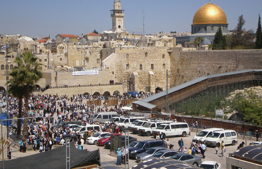Parashat Behar: Shemita—Rest for Rejuvenation

Today it's very not politically correct to say that a certain sin caused a particular tragedy. "Do you know what G-d was thinking?!" Even so, there are situations where you don't have to try too hard. Our Sages reveal why we are now in exile. One reason is: shemita.
"When you enter the land that I assign to you, the land shall observe a Sabbath to the L-rd … But in the seventh year the land shall have a Sabbath of complete rest … you shall not sow your field or prune your vineyard" (Vayikra 25: 1,2,4).
Crime and Punishment
Today it's not politically correct to say that a particular sin is responsible for a certain tragedy. If someone dares link crime and punishment, people will argue, "Do you know what G-d was thinking?!" In principle this is true—we (at least most of us) really don't know what G-d's calculations are. However, there are cases where we don't have to work too hard to figure it out. At times, Chazal and even the Torah itself reveal to us what the crime is that begets a certain punishment. A clear example of this is shemita.
Included in the "curses of Torat HaKohanim," as Chazal refer to the curses that appear in parashat Bechukotai, the verses clearly state that the exile is an excellent time for the Land of Israel to "catch up on its sleep," and make up the time it was supposed to rest during the shemita years. Rashi (ibid., 35) even precisely calculates and demonstrates how the seventy years of the Babylonian exile match the years of shemita and yovel that the Jewish People failed to observe.
Here we might ask: what's the connection? Is there really something to land being sleep-deprived? Does it really need these sabbatical years? We can easily understand that if the Jewish People don't internalize that the land is G-d's and act as if they own it, it is necessary to wake us up through exiling us from the land. However, the references to the land's needing rest are rather surprising—after all, soil is inanimate.
Today, we know that shemita is vital for land to replenish its mineral reserves as well as other resources. This is also the rationale behind alternate sowing cycles that were employed since ancient times. Even so, it seems that this explanation is insufficient; if the land does not lie fallow, the farmer himself will see how the soil's fertility is depleting. In this case, exile is unnecessary.
It seems we cannot escape saying that the Land of Israel had to make up for lost years of sleep; however, these were not merely meant for the soil's physical needs, but rather for its spiritual rejuvenation.
Rabbi Yoel Sirkis writes in his commentary Bayit Chadash (Bach) on the Tur (OC §208) that we mention in the birkat me'ein shalosh (al hamichya) "and we will eat from its fruits and be satisfied by its goodness": "since by eating of its fruits, we receive nourishment from the sanctity of the Divine Presence and its purity; [it is in this manner that] we are satisfied by its goodness." He further explains that impurity in the land, which can be caused by the nation's sins, can be manifested also in its fruits and thus also affect those eating them. At the same time, the way of the world is that precisely those who work the soil are also at the greatest risk to become spiritually degraded to ground level. In this way, the danger is double ended: the land can deteriorate and so can the nation living on the land.
A time to embrace, and a time to shun embraces
Let's take this one step further. The shidduch, so to speak, between the Jewish People and the Land of Israel is beautiful and fitting, but it also contains a risk. In practice, the relationship between the two can be likened to a relationship between man and wife ("As a youth espouses a maiden, your sons shall espouse you; and as a bridegroom rejoices over his bride, so will your G-d rejoice over you", Yeshayahu 62:5). The encounter between man and wife certainly can bring about tremendous blessing, due to the characteristics of each. If gone about the wrong way, though, this relationship can become disastrous: "if they merit, the Divine Presence rests between them; if they do not merit, fire consumes them" (Sotah 17a). Perhaps this is why in marriage there is also "a time to embrace and a time shun embraces"(Kohelet 3:5); a period where halacha imposes certain distance so each partner can replenish their strength—both physical, but especially spiritual—so that their next renewed relationship will be more sacred and pure, one that elevates and not the opposite, G-d forbid.
The same holds true in our relationship with the Land of Israel. At times, this beautiful relationship can be fraught with pitfalls along the way. These mistakes can be rectified by allowing there to be a year (and during the yovel, two consecutive years) of separation: the land is left alone and allowed to lie fallow while man takes a break from working the soil and invests in his spiritual world. When this vital resting period is not observed, the minor problems and corruption snowball into major corruption, which require rehabilitation. The Jewish People must then leave the land: "then shall the land rest and make up for its Sabbath years." When in exile, disconnected to a certain degree from our engagement with the material and physical, we are left to engage only with spirituality. This is in no way ideal, since we were created to engage in the physical world and rectify it by imbuing it with spirituality! However, if this rectification is not being performed in the Land of Israel, there is no point for us to be living there. After both land and people fill their respective requirements, they can once again meet—this time with renewed vigor, to fulfill their ultimate purpose together: to rectify the world.




